SNP threaten independence white paper
The Scottish National Party (SNP) will publish a white paper on a referendum for Scottish independence within two weeks, party sources have confirmed.
The pledge confirms what the SNP had promised throughout its election campaign, but has already provoked strong reactions from other parties in the Scottish Assembly.
Any referendum could only be triggered following a parliamentary vote but the mathematics do not favour SNP leader Alex Salmond’s mission.
By his own admission, only 50 of the 129 MSP are in favour of independence.


“There is nowhere near a majority for independence in the Scottish Parliament,” said Nicol Stephen, leader of the Scottish Liberal Democrats.
“Every minute spent on this document is a distraction from more important priorities such as health, education and crime.”
Labour MSP George Foulkes agreed.
“The SNP’s plans to publish a white paper on independence confirm their arrogance and failure to listen to the overwhelming views of the Scottish public,” he said.
“Despite two thirds of Scots voting against independence just months ago, the SNP are hell bent on breaking up Britain.
“Labour will resist their plans at every turn.”
But the Scottish Green party are standing by the SNP. The Greens claim a majority of the Scottish population wants to extend powers for the Scottish Assembly, and that a “mature debate” on independence is appropriate.
Patrick Harvie, Green policy convener said: “Given the lack of a majority, the challenge for the first minister is to produce a white paper which will provoke real debate across the traditional dividing lines.
“We’ve just had an election in which pro-independence arguments were stacked up against pro-UK arguments, with each side shouting the other down.
“What’s needed now is a more long term, thoughtful discussion about Scotland’s constitutional future,” he continued.
“Nobody has a monopoly of ideas or inspiration, and nobody should be resistant to having their own ideas challenged.”
Independence from the Union has arguably been the dominant issue of Scottish politics for over thirty years.
Polls trying to gauge the level of support for independence offer contradictory results, with a Scotsman poll conducted in November 2006 showing a majority wanting independence being followed weeks later by another that showed the exact opposite.
When respondents are offered a third option of greater devolved powers, however, that option commonly gains majority support.









